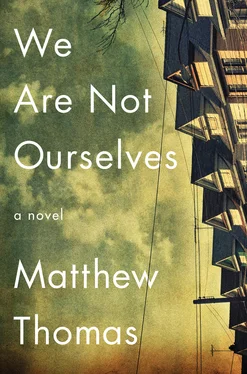She decided to cancel the newspaper delivery and asked him to pick it up from the newsstand in town. It gave him some dignity to have a task to accomplish. He also picked up a quart of milk. She didn’t always need the milk, but routine made life easier; things got burned into his long-term memory. Most of the time the milk made it into the refrigerator. Sometimes it spoiled on the countertop. Connell ate cereal at all hours — it seemed to be the only thing keeping him alive at times — so she seldom had to dump it.
Ed also came home with a box of doughnuts every day. She didn’t know why he’d alighted on this fixation. She threw a lot away, but she also ate her share. She’d been eating more lately in general. Stress was driving her to it. She’d gone up a couple of dress sizes in less than a year. Ed ate half a dozen doughnuts a day, but all he seemed to do was get skinnier.
When the summer came, they walked into town together on the weekends. She couldn’t believe how many people he knew along the way. She learned that he liked to camp out on the bench up the block from the Food Emporium. It satisfied her to have been right in the end about the move. He would not have been able to live as freely in Jackson Heights.
She slipped money into his wallet when he was sleeping, as she’d done with her father after he’d retired, to keep him flush for his nighttime bar crawls. Most of the storekeepers knew him, which helped when he was at the register. He handed his wallet over and they fished out the right bills and put the change back in. She hoped they were patient with him. The guys at Gillard’s were kind enough to simply keep a tally. Once a week, she stopped on the way home from work to settle his debts.
He liked going to Topps Bakery for coffee and a bun because they had a table and a chair. Diana, the proprietor, brought it over to him personally. “If you never paid,” she told Eileen, “he’d still get it.”
Once, he came home from the Food Emporium looking distraught.
“I don’t think they gave me the right money,” he said.
She checked his wallet. The amount there didn’t match the change on the receipt.
“Did you stop anywhere else?”
He shook his head vehemently. The theft must have been obvious if he’d noticed it. Still, she didn’t know if she could trust his perceptions. She could never be sure anymore if what he was saying conformed to reality.
“Let’s go back,” he said.
She considered the scene that might result, the whole store craning their necks, the mortifying attention, the lack of proof. Her voice would get shrill; she would need to find another place to shop.
“It’s not worth it,” she said. “We’ll leave it alone. Don’t worry, that kid will have bad luck after stealing from you.”
Then she imagined the kid’s sniveling, triumphal expression, and she worked herself up into such a pique that she put Ed in the car and drove him back to the store. Ed peered into the plate-glass window, hands and nose pressed like a child.
“That’s him,” he said, pointing.
She stood staring in at the kid. He was black, and he wore his shirt untucked in the back. He moved gracefully, economically, his quick hands passing items across the scanner from the logjam at the end of the conveyor belt. He looked like someone used to moving faster than others, escaping undetected. He had probably had Ed in his aisle a few times. Maybe Ed had handed him his wallet and asked him to take the money out. Maybe this was the time the kid had taken advantage. Her blood pumped hard; there was a metallic taste in her mouth.
“Sit on that bench,” she said to Ed.
She went inside. The crisp, air-conditioned air in the store clashed with the muggy thickness of the August evening outside, and the shiver that overtook her inflamed her anger even further. She thought of going directly up to the kid’s aisle, but she didn’t want to appear hysterical; better to get the drop on him. She walked as casually as she could to the dairy aisle, where she picked up some eggs. When she got to the kid’s register, the man in front of her was paying. She plucked a pack of gum off the rack and set it on top of the eggs. She held up a crisp twenty.
“I want all the change,” she said as quietly as she could while still conveying the extent of her displeasure. “ All of it. And I will have your job if you ever do that to my husband again. And if you think you can come into this town from wherever the hell you come from and steal from people, you’re mistaken. I will have the police on you.”
The kid gave the wad of gum in his mouth a few slow, aggressive chews as he slid the bills into his hand, gathered the coins, and snapped the receipt off the roll.
“I don’t know what you’re talking about,” he said, handing them over and looking past her to the next customer, whose things he started to scan. She made a show of counting the change in front of the kid. She caught a glimpse of the customer behind her and resented the look he was giving her, which suggested it was she who was in the wrong.
She didn’t move, though. She felt like she was just getting started.
“I hope you live long enough to feel the shame you made him feel,” she said. “I hope you are a haunted, lonely old man someday. I hope you are sitting in a nursing home somewhere wondering where everyone is.”
• • •
He told her he went to church between Masses, when the doors were left open, and sat in the back. “It’s quiet,” he said. “Calm.”
She thought about all the tangled noise in his brain. What did it sound like in there? She imagined it to be like the static on a radio tuned between stations.
“What do you think about?” she asked.
“You,” he said. “Connell. I don’t want things to be hard for you when I’m gone, and I don’t want him to get this. I’d do anything to avoid that.”
The thought of Ed alone in that big church oppressed her.
“If I write a prayer for you, will you use it?”
“Sure,” he said.
He might have been telling the truth.
“Dear God,” she wrote, “I will offer this up to you without complaint, but please protect all I know and love.” She copied it out neatly onto an index card that she folded and put in his wallet.
She never heard Ed ask, “Why me?” but she couldn’t help asking it for him. Why Ed? Why now? Why so young? There was the obvious answer — it was random, senseless, genetic, environmental — but she didn’t like that one. She also knew she couldn’t sign on to any system that said it had all happened for a reason. So she took a third path, the pragmatic one. It hadn’t happened for a reason, but they would find something to glean from it anyway. There didn’t have to be a divine plan for there to be meaning in life. People’s lives will be better because of his illness , she told herself. They’ll appreciate life more. He’ll remind them that their lives are better than they think. It was as good a story as any, and it had the virtue of often seeming plausible, though never when she lay awake at night, when the public life faded away, and other people vanished, and she was left staring at the back of her hand and thinking, All of this is an illusion, even the consolations . She was taken back to her bed when she was a child, when she would lie awake listening to her parents in the living room rehearsing their fixed roles after her father had returned from the bar, and she thought, No time has passed since then. I’m there right now. She remembered examining her hand then as well, and the only thing to differentiate this moment from any of a hundred in the past — the only thing that reassured her that the loop of her life wasn’t about to start over again — was the crenellated landscape of wrinkles around her knuckles, which she ran her fingers over, feeling their washboard knobbiness.
Читать дальше
Конец ознакомительного отрывка
Купить книгу












